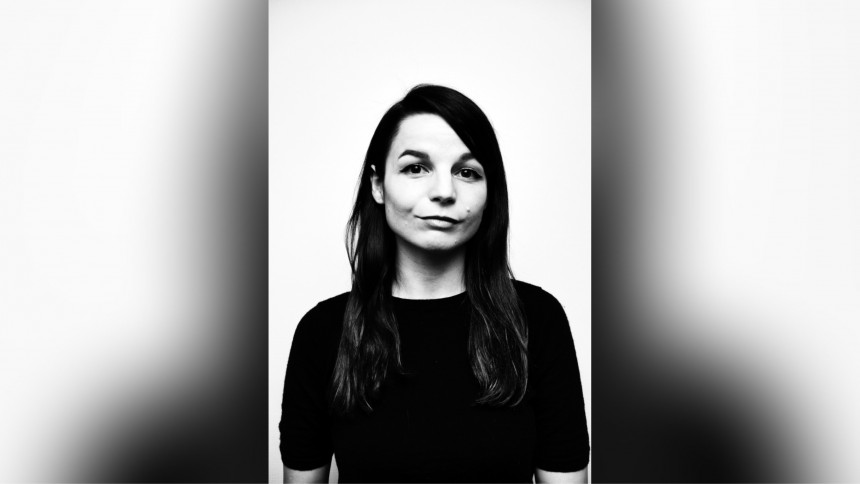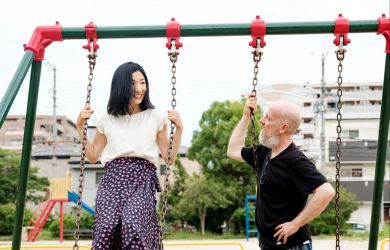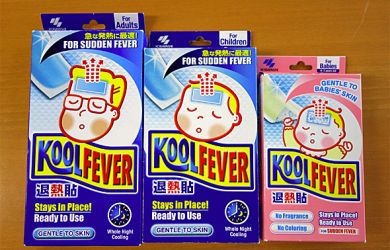
November 8, 2019
The Creative Issue: Alisha Ivelich
Spotlighting the city's 'nonnative' creative scene
Ten summers ago, Alisha Ivelich arrived in Tokyo and did what any wide-eyed, camera-slinging tourist would do. She went sightseeing. In a sunny, lo-fi photograph from that day, Ivelich, at the time a 22-year-old college student finishing a bachelor’s degree in Japanese Language at the University of Oregon, appears beaming in a bright blue sundress outside the Imperial Palace East Gardens. Another photo captures a fortune she received at Sensoji Temple. Among several vague fortuities listed on the slip of paper, one line stands out.
If you are a strong warrior, you can catch and control the whole country by just one arrow.
Mysticism aside, the fortune proved to be quite true. Ivelich is now the face of one of YouTube’s most popular English learning channels, EnglishClass101, which currently has over 3.17 million subscribers, and serves as the native speaker co-host on JapanesePod101, a well-known channel for Japanese learners. When she’s not working with her team to educate thousands of viewers every day, Ivelich writes about dining and travel for Metropolis and The Japan Times, dabbling in translation and editing from to time. She’s also the founder of Nonnative Creative, a video interview series that spotlights creative people working across borders in a variety of fields.
If language isn’t her arrow, it’s pure drive. Throughout the course of a decade, the California-born, Oregon-raised polymath has accomplished far more than a mass online following. Her epitome of success seems rooted in the simple fact that, after all this time, she can now call Tokyo home.
“The start is what stops most people,” Ivelich says, quoting the legendary American football coach Don Shula. Ivelich, on the other hand, is not most people. Her first few years in Japan consisted of a network of trials, errors and explorations into a number of interests. After securing a teaching position at an English conversation school, she took up a string of part-time jobs, passing through a marketing firm, law firm and beer import company. Eventually, she began making videos on Youtube for Innovative Language, a major language education mobile app developer, while also working at an architecture lab for international students at the University of Tokyo, where she proofread thesis papers and provided other English support.
That’s how I’ve continued to move forward — I’ve done this thing, I’ve learned this thing, how do I make something new with it?
While a part of her reveled in the havoc of what she calls “that Tokyo salaryman life,” Ivelich admits to feeling burnt out at times. “That was a very intense few years,” she recalls. “I found at that point in time, I didn’t really have a senpai (senior or mentor). There was nobody to talk to. I couldn’t talk to my parents about what I was experiencing because so much of it was culture related. I was looking for someone to go to for advice and at that time, that person didn’t exist.”
Then came Nonnative Creative. Launched in 2017, the project began as a way for Ivelich to connect with those who, like herself, found themselves in “that in-between space” of belonging to more than one country or cultural identity. Through spotlighting individuals from various backgrounds and creative pursuits, Ivelich aims to share the joys and challenges of being a “nonnative” person and inspire young people by helping them identity new role models. The project’s long-term goal is to provide study abroad scholarships for students.
Among her subjects are Jan Vranovsky, an architect, photographer and graphic designer from the Czech Republic, and Yuka Hyuga, a kendama (Japanese skill toy) whiz working to expand the subculture for girls worldwide. “I feel that the YouTube community, at least in Japan, and the online community in general, is still very much focused on the same experiences,” Ivelich says, noting the hackneyed convenience store vlog for one. “If we’re never getting past those kind of easily packageable YouTube videos, how do we ever learn to connect with people on a deeper level?”
Currently at five mini documentary-style episodes, the project will grow into a weekly series comprised mostly of podcasts and videos, with the first interview set to release in November. Meanwhile, YouTube remains Ivelich’s main gig. In addition to scripting and filming videos every week, she also runs a viewer Q&A series called “Ask Alisha” and hosts the channel’s weekly English livestream, which averages over 60,000 viewers from around the world.
On juggling multiple passions, Ivelich says, “If you have an interest in a thing, just give it a try. That’s how I’ve continued to move forward — I’ve done this thing, I’ve learned this thing, how do I make something new with it? Most of the time, the first thing I make sucks.” She bursts into laughter before resuming a more serious tone.
“And then I make something better.”





